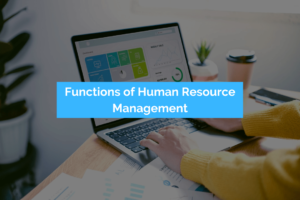Human Resource Development (HRD)
Human resources must be created to adapt to changes in an organization's external environment. Human resource development (HRD) aids in the adaptation of such changes by enhancing existing human resources in terms of skills, knowledge, and performance capacity.

It refers to the development of both the individual and the organization in order to improve human resource capabilities inside the organization. Employee capacity is determined by their educational opportunities.
The combined use of training, organization, and career development activities to increase individual, group, and organizational effectiveness is known as human resource development (HRD). Through organized learning activities, HRD builds core competencies that enable employees of a company to perform current and future requirements of assignments and/or employment.
HRD can also be used to manage and initiate change. It also ensures that the requirements of the employees and the needs of the organization are in sync.
HRD is a role of an organization that provides possibilities for an individual employee to improve present and future work performance while also maximizing the use of human capital to increase the organization's efficiency. In an ideal world, well-designed and implemented HRD systems are an inherent part of an organization's strategic plan, benefiting both employees and the company.
Importance of HRD
Even a strong market position in a highly competitive industry cannot be maintained or developed with subpar employees. To achieve hard but attainable goals, it takes the greatest people to give their all on a regular basis.
To stay on top of the competitive stack, it takes people with exceptional education, training, and experience who are interested in preserving initiative in the face of properly assessed business risks.
It needs people that take pride in their job and use their talents and disciplines with care to deliver a marketable product of fine competitive quality on time and within budget. It takes first-line supervisors who are acutely conscious of their power over their subordinates and who, by example, motivate them to accomplish their tasks more effectively.
To engage in public service activities, a corporation must be healthy and prosperous. This necessitates managers with exceptional abilities to anticipate and capitalize on possibilities while keeping the wheels running, costs low, and earnings high.
Instead of simply reacting to change, broad-gauged managers who see beyond the four walls of their offices are needed to originate and profit from social change. Making business plans a reality requires managers with unique talents in communication, organization, selection, utilization, motivation, and personnel development.
Compensation, vacations, holidays, fringe benefits, moving expenses, and transfer allowances are all covered by employee relations policies, as well as performance appraisal, discrimination, termination, severance pay, promotions, manpower development, educational assistance, disciplinary action, and discharge.
Employee relations policies that are good, sound, and up to date, and that are successfully implemented, help to reduce conflict and internal disagreement. They communicate and clarify. They serve as guidance for managers making human resource choices. They assist in the recruitment of top-tier executives. For example, if a company's compensation policy allows for compensation over the market rate for executive talent, the work of recruitment becomes significantly easier. Money matters, especially at the middle management levels.
When you add in a solid fringe benefit package, such as a holiday and vacation schedule that is on the liberal side for the business, your chances of converting a prospect increase even more. When this is combined with a formal program of educational aid, which includes a plan for individual career development, the odds are considerably better.
The chances greatly favor the corporation in the recruitment market as the candidate sees his job responsibilities spelled out, visualizes how and where he may contribute, recognizes his paths for promotion, and then discovers it will cost him nothing to relocate his family.
Human Resource Development in India
Education is at the heart of Human Resource Development, as it plays a critical and corrective role in balancing the country's socio-economic fabric.
Our billion-strong nation, whose population is its most valuable resource, requires nurturing and care in the form of basic education in order to improve its quality of life. This necessitates the holistic development of our population, which can be accomplished by laying strong educational foundations.
The Ministry of Human Resource Development (MHRD) was established on September 26, 1985, by the 174th modification to the Government of India (Allocation of Business) Rules, 1961, to carry out this objective. The MHRD is currently divided into two departments:
- Department of Higher Education
- Department of School Education and Literacy
While the Department of School Education and Literacy is in charge of the country's school education and literacy, the Human Resource Development Ministry's Department of Higher Education is in charge of one of the world's largest higher education systems, second only to the United States and China.
Visit our social media pages for more interesting ideas and information about Human Resources and Payroll. The links are given below:
https://www.facebook.com/lingueeGlobal
https://www.instagram.com/lingueeglobalsolutions/



